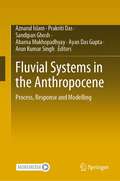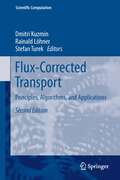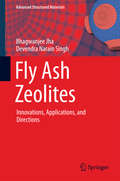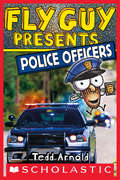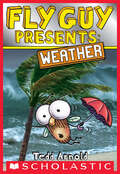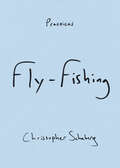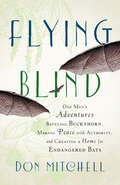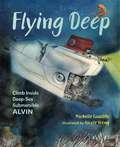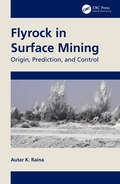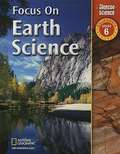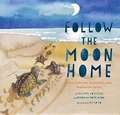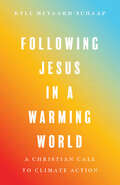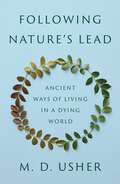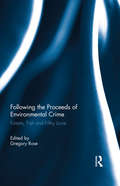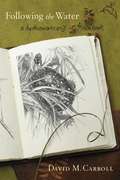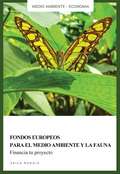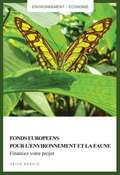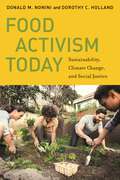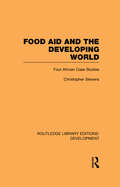- Table View
- List View
Fluvial Systems in the Anthropocene: Process, Response and Modelling
by Sandipan Ghosh Aznarul Islam Arun Kumar Singh Prakriti Das Abarna Mukhopadhyay Ayan Das GuptaThis book addresses the various factors affecting fluvial systems, the processes governing them, system responses arising from human-nature interventions, and geospatial and geo-ecological modeling to understand system behaviour better and restore degraded ecosystems around the globe. Thanks to their hydrological and agro-ecological advantages, humans have settled along riverbanks since the dawn of civilization. Thus, the ancient "ecumene" (settlements) were located near major rivers worldwide. This legacy of river-based civilizations continues to this day in many forms. However, in the course of the 'Anthropocene' era, countless fluvial systems have been altered by human interventions in the form of large-scale dams and barrages, changes in land use and land cover, road-stream crossings, mining of sand and gravel, mushrooming of brickfield, expansion of modern agriculture, industrial growth, and urbanization. Thus, the present-day development pattern threatens fluvial systems, especially riverine morphology and ecosystems. In brief, human-induced morphological changes, water pollution, eutrophication, and related damages to aquatic organisms are the major threats to fluvial systems. Thus, maintaining the 'environmental flow' of the world's major rivers to preserve the proper functioning of riverine ecosystems and promote sustainable development is a global challenge.
Flux-Corrected Transport
by Dmitri Kuzmin Rainald Löhner Stefan TurekAddressing students and researchers as well as Computational Fluid Dynamics practitioners, this book is the most comprehensive review of high-resolution schemes based on the principle of Flux-Corrected Transport (FCT). The foreword by J.P. Boris and historical note by D.L. Book describe the development of the classical FCT methodology for convection-dominated transport problems, while the design philosophy behind modern FCT schemes is explained by S.T. Zalesak. The subsequent chapters present various improvements and generalizations proposed over the past three decades. In this new edition, recent results are integrated into existing chapters in order to describe significant advances since the publication of the first edition. Also, 3 new chapters were added in order to cover the following topics: algebraic flux correction for finite elements, iterative and linearized FCT schemes, TVD-like flux limiters, acceleration of explicit and implicit solvers, mesh adaptation, failsafe limiting for systems of conservation laws, flux-corrected interpolation (remapping), positivity preservation in RANS turbulence models, and the use of FCT as an implicit subgrid scale model for large eddy simulations.
Fly Ash Zeolites
by Bhagwanjee Jha Devendra Narain SinghThis book presents a thorough review of the state-of-knowledge and recent innovations in the synthesis of pure and improved grades of fly ash zeolites (FAZ). Addressing improvements to conventional methods, it also showcases a novel technique for the synthesis of high cation exchangers from fly ash and detailed characterization techniques for the products obtained. In addition, it examines in detail various areas of specific applications of fly ash zeolites. Over the years, several methods such as hydrothermal, fusion prior to hydrothermal, microwave assisted hydrothermal and molten salt techniques for producing FAZ have been developed. However, one-step and two-step reactions between the fly ash and alkali usually generate alkaline wastes that may cause environmental contamination. In addition, the separation of FAZ from the partially activated fly ash (the impurities) remains a major concern for researchers and industrialists alike. In view of these challenges, this book presents a novel technique for three-step activation (TSA), which focuses on recycling the fly ash-NaOH-water reaction by-products until zeolitic residue is formed. The FAZ (the final residue after third step reactions) synthesized in this manner exhibits exceptionally high cation exchange capacity, specific surface area and pore area. This book offers a comprehensive compendium of reading material on fly ash and its recycled product, the zeolites. Students at both undergraduate and graduate levels, researchers, and practicing engineers will all find this book to be a valuable guide in their respective fields.
Fly Guy Presents: Police Officers (Scholastic Reader, Level 2 #11)
by Tedd ArnoldFly Guy is buzzing over to the police station to learn all about police officers!Fly Guy and Buzz are visiting a police station on their latest field trip. They will learn all about police officers: job duties and responsibilities, police dogs, uniforms, police cars, community policing, police stations, police chiefs, police academies, detectives, and even how and when to use 9-1-1. There's so much to learn about these important community helpers! Award-winning author-illustrator Tedd Arnold brings nonfiction to life for beginning readers. There are humorous illustrations and engaging photographs throughout. The front cover features eye-catching holographic foil!
Fly Guy Presents: Weather (Scholastic Reader, Level 2)
by Tedd ArnoldLearn all about weather with Fly Guy!It's time for a field trip! Fly Guy and Buzz are going to a weather station to learn all about weather. With straightforward text, humorous asides, and kid-friendly full-bleed photographs throughout, young readers will love learning about tornadoes, hurricanes, blizzards, and much more! Award-winning author/illustrator Tedd Arnold really brings nonfiction to life for beginning readers! And this book has eye-catching holographic foil on the front cover!
Fly-Fishing (Practices)
by Christopher SchabergIn Fly-Fishing, Christopher Schaberg ponders his lifetime pursuit of the widely mythologized art of fly-fishing. From the Michigan lakeshore where he learned to fish to casting flies in a New Orleans bayou, Schaberg sketches landscapes and fish habitats and shows how fly-fishing allows him to think about coexisting with other species. It offers Schaberg a much-needed source of humility, social isolation, connection with nature, and a reminder of environmental degradation. Rather than centering fishing on trophies, conquest, and travel, he advocates for a “small-fishing” that values catching the diminutive fish near one’s home. Introspective and personal, Fly-Fishing demonstrates how Schaberg’s obsession indelibly shapes how he understands and lives in the wider world.
Flying Blind: One Man's Adventures Battling Buckthorn, Making Peace with Authority, and Creating a Home for Endangered Bats
by Don MitchellWhen Middlebury writing professor Don Mitchell was approached by a biologist with the Vermont Fish and Wildlife Department about tracking endangered Indiana bats on his 150-acre farm in Vermont's picturesque Champlain Valley, Mitchell's relationship with bats—and with government—could be characterized as distrustful, at best.But the flying rats, as Mitchell initially thinks of them, launched him on a series of "improvements" to his land that would provide a more welcoming habitat for the bats—and a modest tax break for himself and his family. Whether persuading his neighbors to join him on a "silent meditation," pulling invasive garlic mustard out of the ground by hand, navigating the tacit ground rules of buying an ATV off Craigslist, or leaving just enough honeysuckle to give government inspectors "something to find," Mitchell&’s tale is as profound as it is funny—a journey that changes Mitchell&’s relationship with Chiroptera, the land, and, ultimately, his understanding of his own past.Ruminating on the nature of authority, the purview of the state, and the value of inhabiting one&’s niche—Mitchell reveals much about our inner and outer landscape, in this perfectly paced and skilled story of place.
Flying Deep: Climb Inside Deep-Sea Submersible Alvin
by Michelle CusolitoClimb aboard Alvin, the famous deep-sea submersible credited with helping to find the Titanic, and take a trip two miles down to the bottom of the ocean.Experience a day in the life of an Alvin pilot and join scientists at the seafloor to collect samples and conduct research. Along the way, discover what one wears, eats, and talks about during a typical eight-hour trip in a underwater craft and find out more about the animals that live deep in our oceans. Extensive back matter explains how Alvin works, describes the author's research, and includes a glossary and further reading."An appealing, exhilarating, and informative vicarious journey of discovery" —Kirkus Reviews, STARRED REVIEW"Wong&’s detailed illustrations add an exciting immediacy to the descent and to the glowing wonders of the deep&”—Washington Post
Flyrock in Surface Mining: Origin, Prediction, and Control
by Autar K. RainaThis book provides a comprehensive understanding of historical and recent research, with a critical review of several aspects of the flyrock phenomenon, along with classification of pertinent literature. This puts flyrock into proper perspective and develops a comprehensive regime for flyrock prediction and control. It also addresses the blast danger zone demarcation based on scientific understanding in comparison to the consequence-based approach supported by pertinent case studies. Features: Discusses exclusive material on flyrock in surface mining. Presents comprehensive and critical review of the flyrock phenomenon. Reviews prediction and control mechanisms in vogue with scientific and risk-based definitions of blast danger zone. Provides new insights into the flyrock definitions, prediction, and prevention along with the research approach to the problem. Includes Indian case studies and summarize global data available in the published domain. This book is aimed at researchers and graduate students in mining and civil engineering, engineering geology, and blasting.
Focus On Earth Science
by James Sammons Mary Beth Abel Hughes Patsy Eldridge Lynda PennellNIMAC-sourced textbook
Focus On Earth Science (California)
by Douglas Fisher Dinah Zike National Geographic Donna L. Ross Elizabeth A. Nagy-Shadman Jan Vermilye Joseph J. Kerski Juli Berwald Julie Meyer Sheets Nancy Trautmann Sergio A. GuazzottiNIMAC-sourced textbook
Focus on Earth Science
by Cpo ScienceContains comprehensive content that introduces your students to key earth science concepts including energy, plate tectonics, weathering, earthquakes, volcanoes, and ecosystems. The text also integrates important ideas in science such as heat, density and buoyancy.
Folklore of American Weather
by Eric SloaneIn preparing this unusual book of American weather sayings and beliefs, Eric Sloane has made a painstaking effort to separate the true from the false, investigating origins and separating the many truly valuable pieces of weather lore from superstition, or what he calls "jackass jingles." As Mr. Sloane makes clear, folklore can be a very loose term used to cover a lack of knowledge of the very thing that folklore means: many things are passed off as folklore that are plain mistakes or inventions. Following general introductory remarks, Mr. Sloane has arranged his findings in an alphabetical folklore dictionary, enabling the reader to find readily the signs involving stars, wind, dew, rain, or whatever else he wishes. After each entry is a symbol indicating whether it is true (T), false (F), or possible (P). Thirty-five drawings by the author clarify and enhance the text of this entertaining and informative new book by America's favorite weather expert.
Follow the Moon Home: A Tale of One Idea, Twenty Kids, and a Hundred Sea Turtles
by Deborah Hopkinson Philippe Cousteau<P>Acclaimed activist Philippe Cousteau and renowned author Deborah Hopkinson team up to offer a story of the powerful difference young people can make in the world. <P>Meet Viv, who has a new home and a new school by the sea, and follow her as she finds her way in a new place and helps bring together a whole community to save the sea turtles of the South Carolina coast.
Follow the Water from Brook to Ocean
by Arthur DorrosExplains how water flows from brooks, to streams, to rivers, over waterfalls, through canyons and dams, to eventually reach the ocean. <P><P>[This text is listed as an example that meets Common Core Standards in English language arts for K-1 at http://www.corestandards.org.]
Following Jesus in a Warming World: A Christian Call to Climate Action
by Kyle Meyaard-SchaapHave you ever looked at the effects of climate change and the apathy of so many around you and wondered, "What are we missing here?" Climate activist Kyle Meyaard-Schaap understands this feeling from personal experience. But in his years of speaking to and equipping Christians to work for climate action, he's seen the trend begin to shift. More and more young Christians are waking up to the realities of climate change. They want to help, but they're not sure how. Through stories from the field, theological and scriptural exploration, and practical advice, Meyaard-Schaap offers hope to Christians paralyzed by the scale of the crisis, helping us turn our paralysis into meaningful action. Following Jesus in a Warming World is a field guide for Christian climate action—one grounded not in a sense of guilt or drudgery, but in the joy of caring for creation.
Following Nature’s Lead: Ancient Ways of Living in a Dying World
by M. D. UsherIn the spirit of E. F. Schumacher&’s Small Is Beautiful, a dazzling and revelatory exploration of what ancient ideas and ways of living can teach us about creating a more sustainable worldHow should we think and live in a world facing environmental catastrophe? In this urgent, original, and wide-ranging book, classicist and farmer M. D. Usher brings together ancient, indigenous, and modern ideas about how to live in this world and describes how we might begin to reconnect with Nature and heal our damaged planet and lives. The ancients hewed close to Nature, the source of their survival, in ways that most of us can scarcely conceive of today, and ancient philosophy often argues that humans should follow Nature&’s lead. Usher makes the case that Nature&’s resilience can serve as a model for our own responses to climate trauma and all the other harms caused by modern lifestyles.Drawing on philosophy, science, economics, art, literature, history, and religion, Following Nature&’s Lead is both an indictment of human overreach and a celebration of human ingenuity and the adaptability of Nature. Here, Plato meets German biologist Jakob von Uexküll, Lucretius illuminates King Lear, and Diogenes the Cynic crosses swords with Henry Thoreau.Filled with vital and inspiring insights, Following Nature&’s Lead shows how the ancients can help teach us to live in accordance with Nature—and why it&’s essential for human survival that we learn to do so without delay.
Following the Proceeds of Environmental Crime: Fish, Forests and Filthy Lucre
by Gregory RoseHuge quantities of natural resources are illegally harvested and their proceeds laundered in the Asia-Pacific region, fostering corruption and undermining environmental governance. Most illegal exploitation and pollution occurs in countries with poor governance capacities, but much of the sale for profit and money laundering occurs in mature markets with well-developed governance capacities. Their asymmetrical enforcement capacities can complement each other. This book explores ways to combat illegal fishing and logging in Asia-Pacific region by the use of cooperative legal measures, particularly anti-money laundering and confiscation of proceeds techniques. Contributors to this volume cover themes including: the nature of transnational environmental crime; patterns in laundering of illicit fish and forest products; networks for distribution of illicit products; weaknesses in current systems for assurance of the legality of products; and international legal cooperation to enforce anti-money laundering laws in relation to illicit products. In considering these topics the book explores how the innovative use of anti-money laundering measures and the seizure of criminal proceeds can as policy options to combat transnational fishery and forestry crimes. The book will be of keen interest to scholars and students of environmental law and criminal law, and excellent use for practitioners in natural resources conservation law.
Following the Water: A Hydromancer's Notebook
by David M. CarrollThe writer, naturalist, and artist David Carroll illuminates the ecology and life histories the tree frogs, hawks, foxes, and the increasingly rare wood and spotted turtles he has been tracking for decades with the precision and passion that won him a 2006 MacArthur "genius" award.Following theWater is the intensely observed chronicle of Carroll's annual March-to-November wetlands immersion-from the joy of the first turtle sighting in March to the gorgeously described, vibrant trilling of tree frogs ("lichen with eyes") in late May to the ancient sense of love and loss Carroll experiences each autumn when it is time once again to part with open water.Illustrated with the author's fine pen-and-ink drawings, Following theWater is a gorgeous evocation of nature, an utterly unique "admission ticket to a secret corner of the world" (Bill McKibben).
Fondos europeos para el medio ambiente y la fauna: Financia tu proyecto
by Erica RoggioLa Unión Europea es uno de los principales donantes a nivel mundial. La gestión de los recursos naturales, la agricultura, la pesca, el desarrollo rural, la investigación, la mitigación y la adaptación a los cambios climáticos forman parte de las políticas prioritarias de la Unión, que utiliza gran parte de su presupuesto para implementarlas. Conocer los 14 instrumentos y fondos de la UE destinados a la financiación de proyectos de carácter medioambiental es fundamental para identificar las oportunidades y los actores claves en las varias instituciones, así como para prepararse a la publicación de las convocatorias. A través de fichas técnicas, ejemplos concretos y recursos on-line, esta guía se propone orientar a los operadores interesados en iniciar actividades de gestión y conservación medioambiental y faunística, a escala regional y global. DICEN DEL LIBRO “El primer libro que trata este tema, sintetizando los requisitos de admisibilidad de las ideas proyectuales. Un manual indispensable para los que se dedican a este sector, incluidos los expertos en los contenidos y los europroyectistas con ideas innovadoras” Riccardo Di Giuseppe, Director oasis WWF Reserva Natural Estatal Litoral Romano, Italia
Fonds européens pour l'environnement et la faune. Financez votre projet
by Erica RoggioL’Union européenne est l’un des principaux bailleurs de fonds au niveau mondial. La gestion durable des ressources naturelles, l’agriculture, la pêche, le développement rural, la recherche, l’atténuation et l’adaptation aux changements climatiques constituent les politiques prioritaires de l’Union européenne, qui mobilise une grande partie de son budget pour les mettre en œuvre. Connaître les 14 instruments et fonds européens qui financent les projets sur l’environnement est indispensable pour identifier les opportunités et les acteurs clé parmi les institutions et se préparer à la publication des appels. Au travers de fiches techniques, d’exemples concrets et des ressources en ligne, ce guide propose d’orienter les opérateurs intéressés à s’engager dans des activités de gestion et de conservation de l’environnement et de la faune à l’échelle régionale et globale. ILS ONT DIT DU LIVRE « Le premier livre en italien qui affronte ce sujet, en synthétisant les conditions d’éligibilité de l’idée de projet. Un manuel indispensable pour tous les spécialistes, y compris les experts du contenu ainsi que les euro concepteurs avec des propositions innovantes » Riccardo Di Giuseppe, Directeur de l’Oasis WWF Réserve Naturelle d’Etat du Littoral Romain, Italie
Food Activism Today: Sustainability, Climate Change, and Social Justice (Social Transformations in American Anthropology #6)
by Dorothy C. Holland Donald M. NoniniIlluminates how food activism has been taking shape and where it is headedAs climate change, childhood obesity, and food insecurity accelerate at an alarming pace, activists around the country are working to address the pressing need for healthy and sustainable solutions to feed the population. Food Activism Today investigates the new approaches food activists are taking as they formulate alternatives to the current unsustainable agro-industrial food system.Drawing on ethnographic research conducted over an eleven-month period in both urban and rural North Carolina, the volume addresses questions about the moral visions of food activists, how class and racial hierarchies infuse some food activism movements, and how food activism relates to climate change and imminent ecological collapse. Exploring food activism around both local and sustainable food production and food security for lower-income people, the volume finds surprisingly little overlap, with the two movements seemingly remaining distinct approaches (at least for now) to issues around the food system, climate change, and access to healthy food choices.As the US moves into an era in which climate change and neoliberal tensions are conjoined in a looming political crisis, Food Activism Today looks at where food activism is headed, the ethics and issues surrounding alternative approaches to food production, and how food production is related to broader issues of climate change.
Food Aid and the Developing World: Four African Case Studies (Routledge Library Editions: Development Ser.)
by Christopher StevensFood aid is a controversial form of development assistance and this book, first published in 1979, seeks to counter allegations from critics by taking account of both direct and indirect affects. Based on field research in Tunisia, Botswana, Upper Volta and Lesotho, it considers aid from the UK, EEC, USAID, the World Food Programme, Canada and France, and draws a number of policy-orientated conclusions about the impact of food aid on nutrition, consumer prices and agricultural production. In the light of the evidence from field studies it is shown that many of the claims advanced by food aid supporters and by critics cannot be sustained, and that the real impact of food aid is rather different from that assumed by the conventional wisdom on the subject.
